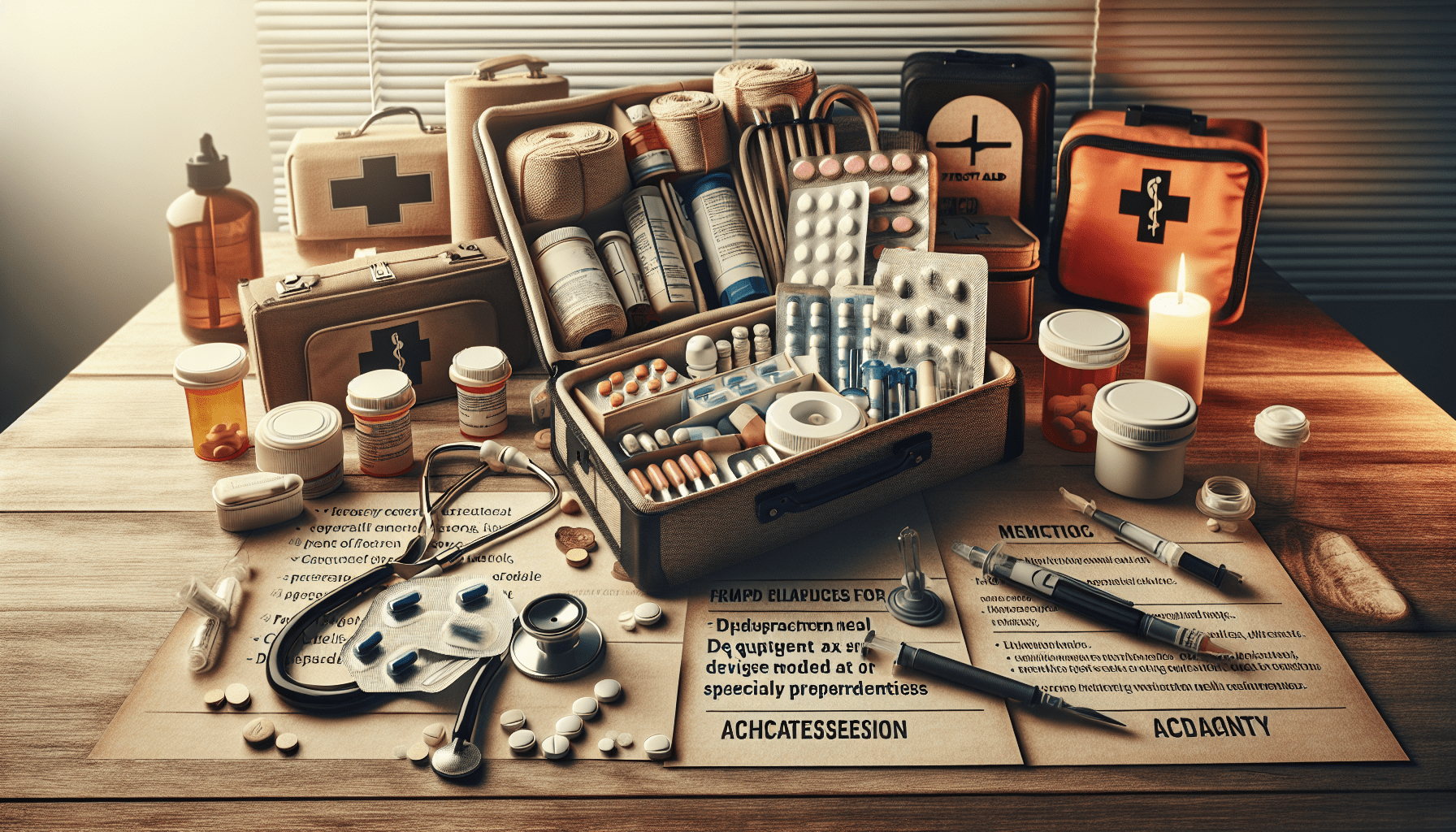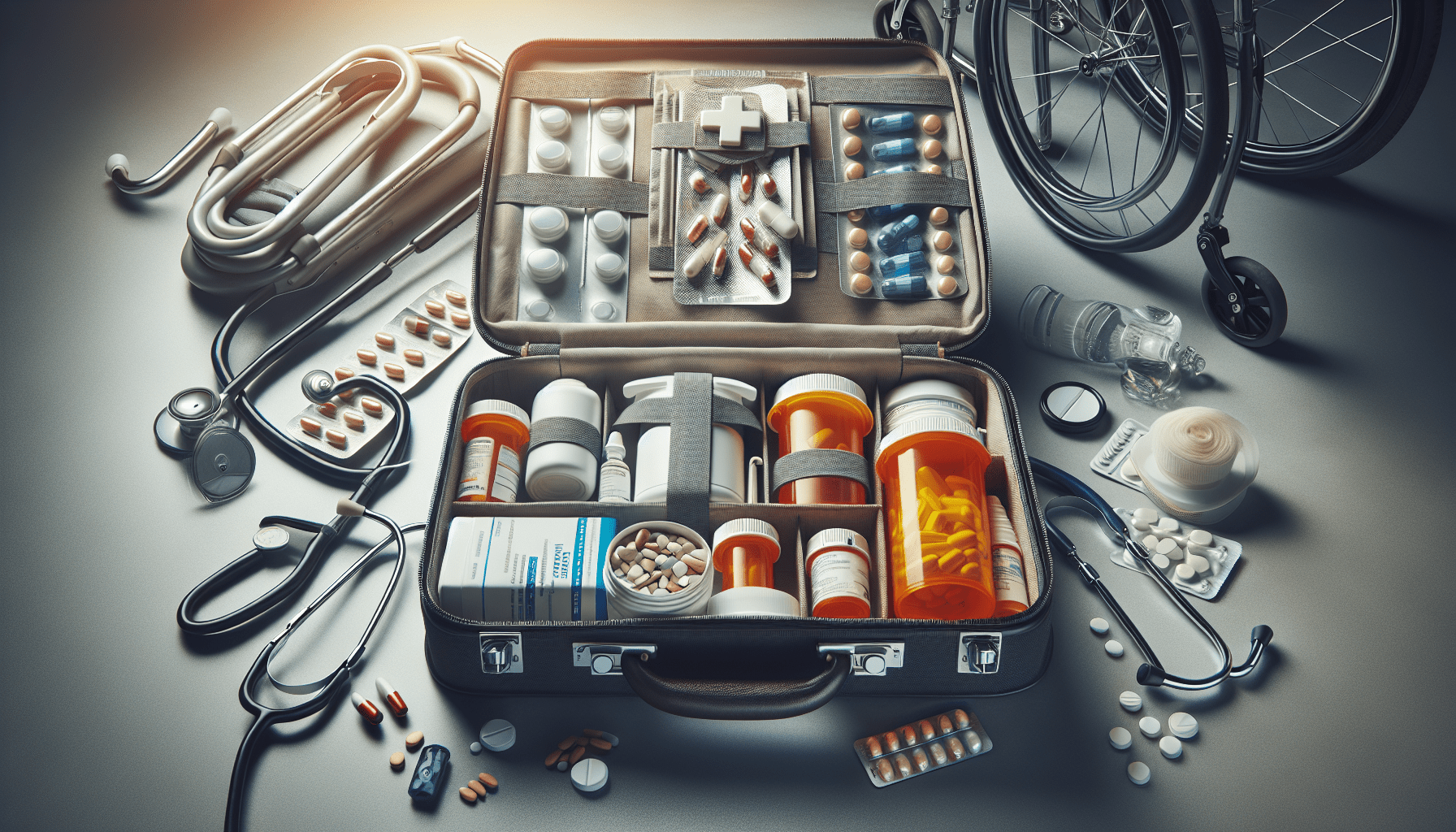Whether it’s a natural disaster or a personal emergency, being prepared can make all the difference when it comes to addressing special medical needs. In this article, you’ll find valuable tips and advice on how to ensure your emergency preparedness kit is equipped to handle any situation. From medications and medical equipment to communication tools and specialized documentation, we’ll explore how to tailor your kit to meet your unique medical requirements and give you peace of mind in times of crisis.

Essential Medications
Having a sufficient supply of prescription medications is crucial during an emergency. Remember to pack at least a two-week supply of your medications to ensure you don’t run out. It’s also a good idea to include over-the-counter medications for common ailments such as pain relievers, antacids, and allergy medication. These can come in handy when access to healthcare facilities may be limited. Additionally, if you require any specific medical equipment or supplies, make sure to include them in your emergency kit.
Medical Records and Documentation
In any emergency situation, it’s essential to have copies of important medical documents readily available. These should include medication lists, healthcare provider contacts, and insurance information. Having copies of your medical records, test results, and prescriptions can also prove invaluable when seeking medical assistance during an emergency. Make sure to keep these documents in a waterproof and easily accessible bag or folder.
Communication and Contact Information
Communication is key during an emergency, especially when it comes to your healthcare. Create a communication plan that includes a list of contacts for healthcare providers, pharmacies, and emergency services. Having these numbers readily available can save valuable time in case of an emergency. It’s also important to include the contact information for family members or caregivers who may need to be notified about your situation. Make sure to share this plan with your loved ones as well.

Special Dietary Needs
If you have special dietary requirements, it’s essential to include non-perishable food items that meet your specific needs in your emergency kit. Consider items that are easy to prepare and store, such as canned goods, protein bars, and meal replacement options. Including supplements if necessary can also ensure you’re getting the necessary nutrients. It’s important to regularly check the expiration dates on these items and rotate your stock to ensure freshness.
Mobility Aids and Assisted Devices
For individuals who rely on mobility aids or assistive devices for daily activities, it’s crucial to include these items in your emergency kit. Whether it’s a wheelchair, cane, walker, or any other aids you use, make sure they are easily accessible and in good working condition. Regular maintenance and periodic checks can ensure they are ready to use when needed. Being prepared will allow you to safely navigate through any emergency situation.
Emergency Power and Backup
If you rely on medical equipment that requires electricity, it’s important to consider a backup power source. This could be a generator, battery backups, or even a power inverter for your car. Having these backup options can ensure that your medical devices continue to function during power outages or emergencies. Additionally, including extra batteries or portable chargers for devices like hearing aids or insulin pumps is crucial to maintain your health during an emergency.
Comfort and Personal Care Items
Taking care of your personal hygiene and comfort is important in any situation, especially during an emergency. Pack personal hygiene items such as wipes, hand sanitizer, and feminine products. These items can help maintain cleanliness and prevent the spread of germs. Including comfort items like blankets, pillows, and favorite snacks can provide a sense of familiarity and aid in reducing stress during challenging times.
Emergency Contact Bracelet or ID
Consider wearing an emergency contact bracelet or carrying a medical ID card with relevant medical information. In case of an emergency, this can help first responders quickly identify any special medical needs you may have. Make sure the information is accurate and up to date. Including details such as allergies, chronic conditions, and emergency contact information is vital for your safety and well-being.
Emergency Preparedness Supplies for Pets
If you have pets with special medical needs, it’s crucial to include necessary medications, food, and supplies for them in your emergency kit. Just like humans, pets may require specific medications or special diets. Make sure to pack an adequate supply of your pet’s medication and their regular food. Including items such as leashes, carriers, and litter can also be helpful. Additionally, have contact information for veterinarians and pet shelters in case you need assistance with your furry companions during an emergency.
Emergency Communication Methods
In some emergency situations, traditional means of communication may not be available. It’s important to consider alternative communication methods to ensure that your special medical needs are known and addressed. A two-way radio can be helpful for staying in contact with others during emergencies. Additionally, having a whistle for signaling for assistance can be a simple yet effective method in case you’re in a location where communication devices fail. Creating a plan for communicating your special medical needs in emergency situations is crucial for your safety and timely access to appropriate care.
By following these tips and incorporating them into your emergency preparedness kit, you can help address your special medical needs during challenging times. Remember to regularly check and update your kit to ensure that all essential items, documents, and supplies are readily available. Being prepared for emergencies will not only provide you with peace of mind but also ensure that you and your loved ones stay safe and healthy.
